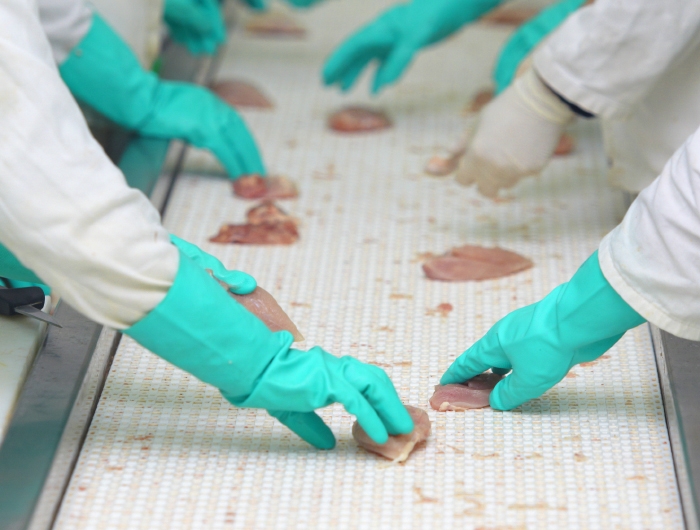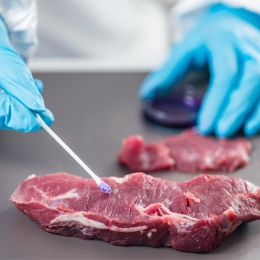Food and health news you may have missed: Oct 6, 2023

picsfive/stock.adobe.com.
Averted government shutdown saves WIC for now, medical tests get new oversight, Big Dairy fights school meals program updates, and more food and health news this week.
Food safety, health, and nutrition news this week
There are no slow weeks when it comes to monitoring the health and safety of America’s food systems, and this week was no different. Here's what you may have missed.
- With a government shutdown averted until at least Nov. 17, when the current continuing resolution’s temporary funding comes to an end, WIC recipients will see uninterrupted assistance and food safety inspections will proceed as usual as the shutdown’s mandatory furloughs for federal workers are allayed. This is good and unexpected news, but it is temporary. CSPI will have updates as the end of this continuing resolution nears.
- CSPI has filed a lawsuit against EpicGenetics, the maker of a laboratory-developed test ostensibly designed to detect fibromyalgia that the company claims is “99 percent accurate.” However, EpicGenetics’ own study reveals that the test generates false positives up to 30 percent of the time for those with certain medical conditions, such as lupus or rheumatoid arthritis. Additionally, EpicGenetics produces another test for what they call “Immune Deficiency Disease,” or IDD, which is not a recognized medical condition but is one apparently designed to fit the results of EpicGenetics’ test, according to the complaint. Our suit alleges false and misleading claims, and that those claims increase the risk that patients could undergo unnecessary medical treatments or forego medical treatments that could work, based on results that are far less reliable than EpicGenetics has claimed.
Read more: CSPI sues EpicGenetics, maker of test for fibromyalgia, for false and misleading claims - The FDA has released a new proposed rule that would allow the agency to better regulate laboratory-developed tests, like EpicGenetics’ as well COVID-19 tests, noninvasive prenatal genetic screening tests, and any other medical test that is developed by an independent laboratory and not conducted at a hospital. “This rule is a critical step forward for clinical medicine,” said Dr. Peter G. Lurie, President of Center for Science in the Public Interest and a former Associate Commissioner at the Food and Drug Administration where he worked on LDTs, including on a report demonstrating their potential dangers. “It will help ensure that when a patient receives a test, they can rely on the results to make essential decisions for their health. This rule will close a gaping hole in FDA’s current regulatory reach.”
Read more: Consumer groups welcome FDA proposal for better regulation of laboratory-developed tests - One overlooked component of the safety of food are public health veterinarians, who ensure cattle and other animals are not sick with diseases that could impact human health. In an effort to reduce costs, the USDA’s Food Safety and Inspection Service appears poised to reduce the number of public health veterinarians, passing their duties to lesser skilled workers and limiting its ability to conduct adequate safety inspections of food animals before slaughter.
Read more on Pear in Mind: Overlooked but essential: The role of public health veterinarians in food safety - CSPI has joined the Environmental Working Group and others in urging Gov. Gavin Newsom to sign the California Food Safety Act (AB 418), a bill that bans certain food additives—namely Red 3, a food dye and known carcinogen that’s banned from topical drugs and cosmetics; brominated vegetable oil; potassium bromate; and propylparaben—from foods sold in the state. It has passed the state Assembly and awaits the governor’s signature. Scott Faber is the senior vice president for government affairs for the Environmental Working Group and a former food industry executive.
Read Faber’s op-ed in Food Safety News: Gov. Newsom shouldn’t wait for the FDA - Recently, CSPI alerted consumers that three manufacturers of powdered infant formula had received letters of warning from the FDA for cronobacter detected in their facilities. Earlier this year, FDA posted new draft guidance for manufacturers, and in California, a bill awaits Gov. Newsom’s signature that would require testing for heavy metals in infant and baby foods sold in the state. AB 899 has passed the state Assembly.
Read CSPI’s letter urging Gov. Newsom to sign AB 418 and AB 899. - October is National Cookbook Month—an admittedly obscure holiday, but one we enjoy, nonetheless. Celebrate with any of The Healthy Cook Kate Sherwood’s collections of simple, tasty, healthy recipes.
Shop them all in CSPI’s holiday gift guide. - As students return to school and legislators return to work, the National School Lunch and Breakfast programs, which provide meals for around 30 million children each year, are under CSPI’s close watch. The USDA is hoping to align its dietary guidelines more closely with meals served in schools—a change that would reduce the sodium content of school lunches and breakfasts by as much as 30 percent by 2029—but Big Dairy has decided that’s not a good move for their industry. They’ve lobbied to add a rider to the House and Senate spending bills that would exempt cheese from nutrition standards in schools—a move that would negatively impact the health of all students who eat at school.
Read more on The Hill: Hold the salt: Don’t let Big Dairy dictate the sodium content of our school lunches - Last week, CSPI published its one-year report on the Biden-Harris administration’s progress toward meeting its commitments set forth at the White House Conference on Hunger, Nutrition, and Health in 2022. Our research found that this administration has completed or made progress on more than three quarters of the commitments that are within the control of the executive branch. However, with only 16 months to go, there has been no documented progress toward one of the most potentially impactful commitments: the commitment to “expand access to healthier food environments in federal facilities” by updating and implementing the Food Service Guidelines for Federal Facilities (FSG) across the government.
Read more: How the Biden administration can transform food in federal facilities for millions of people - It’s that time of year. Pumpkin is making its way into lattes, muffins, and more. But pumpkin doesn’t appear on plates often enough as, well, just pumpkin. NutritionAction has some tips for how to change that.
Read more: It's officially fall. Have you had any pumpkin yet?
Latest News on Government Oversight
BVO: Why the FDA might finally ban brominated vegetable oil
Food Additives

Food news you may have missed: Sep 29, 2023
Food Safety

Infant formula, baby food could soon be safer
Healthy Kids

James Madison would be proud
Government Accountability

Congress introduces legislation to give food labels a much-needed overhaul
Food Labeling


